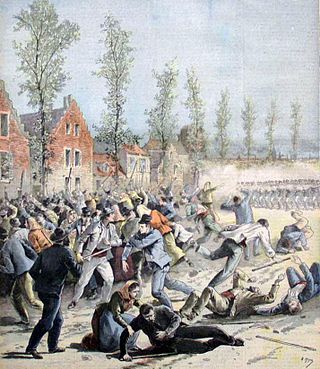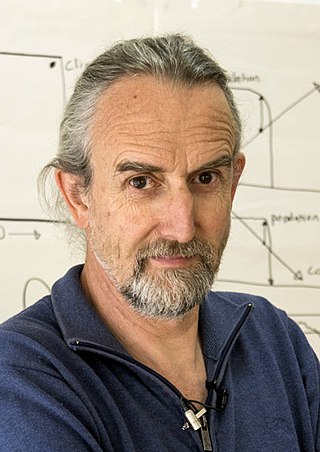Related Research Articles
Anarcho-pacifism, also referred to as anarchist pacifism and pacifist anarchism, is an anarchist school of thought that advocates for the use of peaceful, non-violent forms of resistance in the struggle for social change. Anarcho-pacifism rejects the principle of violence which is seen as a form of power and therefore as contradictory to key anarchist ideals such as the rejection of hierarchy and dominance. Many anarcho-pacifists are also Christian anarchists, who reject war and the use of violence.

The Tolstoyan movement is a social movement based on the philosophical and religious views of Russian novelist Leo Tolstoy (1828–1910). Tolstoy's views were formed by rigorous study of the ministry of Jesus, particularly the Sermon on the Mount.
Christian socialism is a religious and political philosophy that blends Christianity and socialism, endorsing left-wing politics and socialist economics on the basis of the Bible and the teachings of Jesus. Many Christian socialists believe capitalism to be idolatrous and rooted in the sin of greed. Christian socialists identify the cause of social inequality to be the greed that they associate with capitalism. Christian socialism became a major movement in the United Kingdom beginning in the 19th century. The Christian Socialist Movement, known as Christians on the Left since 2013, is one formal group, as well as a faction of the Labour Party.

Christian anarchism is a Christian movement in political theology that claims anarchism is inherent in Christianity and the Gospels. It is grounded in the belief that there is only one source of authority to which Christians are ultimately answerable—the authority of God as embodied in the teachings of Jesus. It therefore rejects the idea that human governments have ultimate authority over human societies. Christian anarchists denounce the state, believing it is violent, deceitful and idolatrous.
Anarchists have traditionally been skeptical of or vehemently opposed to organized religion. Nevertheless, some anarchists have provided religious interpretations and approaches to anarchism, including the idea that the glorification of the state is a form of sinful idolatry.
The Passionists, officially named Congregation of the Passion of Jesus Christ, abbreviated CP, is a Catholic clerical religious congregation of Pontifical Right for men, founded by Paul of the Cross in 1720 with a special emphasis on and devotion to the Passion of Jesus Christ. A known symbol of the congregation is the labeled emblem of the Sacred Heart of Jesus, surmounted by a cross and is often sewn into the attire of its congregants.
Religious socialism is a type of socialism based on religious values. Members of several major religions have found that their beliefs about human society fit with socialist principles and ideas. As a result, religious socialist movements have developed within these religions. Those movements include Buddhist socialism, Christian socialism, Islamic socialism, and Jewish socialism. According to the Encyclopedia Britannica Online, socialism is a "social and economic doctrine that calls for public rather than private ownership or control of property and natural resources. According to the socialist view, individuals do not live or work in isolation but live in cooperation with one another. Furthermore, everything that people produce is in some sense a social product, and everyone who contributes to the production of a good is entitled to a share in it. Society as a whole, therefore, should own or at least control property for the benefit of all its members. [...] Early Christian communities also practiced the sharing of goods and labour, a simple form of socialism subsequently followed in certain forms of monasticism. Several monastic orders continue these practices today".
In the context of Christian eschatology, idealism involves an interpretation of the Book of Revelation that sees all or most of the imagery of the book as symbolic. Idealism is common among Reformed theologians and it is associated with amillennialism. There exists degrees of Idealism, the most radical form sees it as entirely symbolic, while a more moderate view may allow for some historical fullfillment of events.
Jewish anarchism encompasses various expressions of anarchism within the Jewish community.
Ciaron O'Reilly is an Australian anti-war campaigner, peace protester, social justice campaigner and Catholic Worker, having been "engaged in ... protests, acts of civil disobedience and trials in England, Ireland, and his native Australia." He has also become one of the most visible and active practical and theoretical exponents of the ideas of Christian anarchism, arguing that this "'is not an attempt to synthesise two systems of thought' that are hopelessly incompatible, but rather 'a realisation that the premise of anarchism is inherent in Christianity and the message of the Gospels.'"

Anarchism in Australia arrived within a few years of anarchism developing as a distinct tendency in the wake of the 1871 Paris Commune. Although a minor school of thought and politics, composed primarily of campaigners and intellectuals, Australian anarchism has formed a significant current throughout the history and literature of the colonies and nation. Anarchism's influence has been industrial and cultural, though its influence has waned from its high point in the early 20th century where anarchist techniques and ideas deeply influenced the official Australian union movement. In the mid 20th century anarchism's influence was primarily restricted to urban bohemian cultural movements. In the late 20th century and early 21st century Australian anarchism has been an element in Australia's social justice and protest movements.
Contemporary anarchism within the history of anarchism is the period of the anarchist movement continuing from the end of World War II and into the present. Since the last third of the 20th century, anarchists have been involved in anti-globalisation, peace, squatter and student protest movements. Anarchists have participated in violent revolutions such as in those that created the Makhnovshchina and Revolutionary Catalonia, and anarchist political organizations such as the International Workers' Association and the Industrial Workers of the World have existed since the 20th century. Within contemporary anarchism, the anti-capitalism of classical anarchism has remained prominent.

Direct action originated as a political activist term for economic and political acts in which the actors use their power to directly reach certain goals of interest, in contrast to those actions that appeal to others, by, for example, revealing an existing problem, highlighting an alternative, or demonstrating a possible solution.

Zion Lights is a British author and activist known for her environmental work and science communication.

Extinction Rebellion is a UK-headquartered global environmental movement, with the stated aim of using nonviolent civil disobedience to compel government action to avoid tipping points in the climate system, biodiversity loss, and the risk of social and ecological collapse. Extinction Rebellion was established in Stroud in May 2018 by Gail Bradbrook, Simon Bramwell, and Roger Hallam, along with eight other co-founders from the campaign group Rising Up!

The extinction symbol represents the threat of holocene extinction on Earth; a circle represents the planet and a stylised hourglass is a warning that time is running out for many species. The symbol dates to at least 2012 and has been attributed to anonymous East London artist Goldfrog ESP. The symbol has been called "this generation's peace sign". It is used by environmental protesters, and has been incorporated in works by artists and designers such as Banksy. In 2019, the Victoria and Albert Museum acquired a digital copy of the symbol, and other artifacts featuring the symbol, for its permanent collection.

Julian Roger Hallam is a Welsh environmental activist, a co-founder of Extinction Rebellion, cooperative federation organisation Radical Routes and the political party Burning Pink.
Phil Kingston is a climate activist and protester with the climate groups Christian Climate Action and Extinction Rebellion.
Anarchism in Bosnia and Herzegovina first emerged from left-wing currents of the anti-imperialist movement, gaining traction as a tendency in the revolutionary organization Young Bosnia. Following assassination of Archduke Franz Ferdinand and World War I, Bosnia and Herzegovina were brought under a series of authoritarian regimes, before gaining independence in 1992. In the post-independence climate of rising nationalism and income inequality, anarchism re-emerged as part of the nascent anti-nationalist and anti-capitalist movements of the 21st century.
References
- ↑ Independent Catholic News (12 June 2017). "Happy Birthday Father Martin" . Retrieved 20 January 2023.
- ↑ FreeBMD. "GRO Birth records 1967" . Retrieved 9 November 2019.
- 1 2 "Fr Martin Newell – Priest Protester". Alive Publishing. 2018. Archived from the original on 8 November 2019.
- ↑ Liz Dodd (2 May 2019). "The Holy Spirit of Extinction Rebellion". The Tablet. Archived from the original on 8 November 2019.
- ↑ Alexandre Christoyannopoulos (2011). Christian Anarchism: A Political Commentary on the Gospel. Exeter, England: Imprint Academic. pp. 354–356.
- ↑ "Passionist Priest Arrested After Vandalism at Climate Change Protest". Catholic Herald. 3 December 2015. Archived from the original on 8 November 2019.
- ↑ Annette Belcher (1 March 2018). "Birmingham Priest Facing Jail for Non-payment of Fines After Arms Fair Protest". BirminghamLive. Archived from the original on 8 November 2019.
- ↑ Ellen Teague and Ruth Gledhill (17 October 2019). "Catholic and Anglican Clergy Join ER Train Protest". The Tablet. London. Archived from the original on 2 September 2020.
- ↑ "Five Charged over Extinction Rebellion Tube Protests". BBC News. 18 October 2019. Archived from the original on 18 October 2019.
- ↑ Alexandre Christoyannopoulos (2011). Christian Anarchism: A Political Commentary on the Gospel. Exeter, England: Imprint Academic. pp. 355–356, 408ff.
- ↑ O'Reilly, Ciaron (Christmas 2007). "Lockheed lockdown at Christmas" (PDF). London Catholic Worker No. 27. Retrieved 24 January 2023.
- ↑ London Catholic Worker . "Easter Season 2008 No. 22" (PDF). Retrieved 24 January 2023.
- ↑ Kelly, Ann. "Speaking personally" (PDF). London Catholic Worker Easter Season 2011 No. 32. Retrieved 24 January 2023.